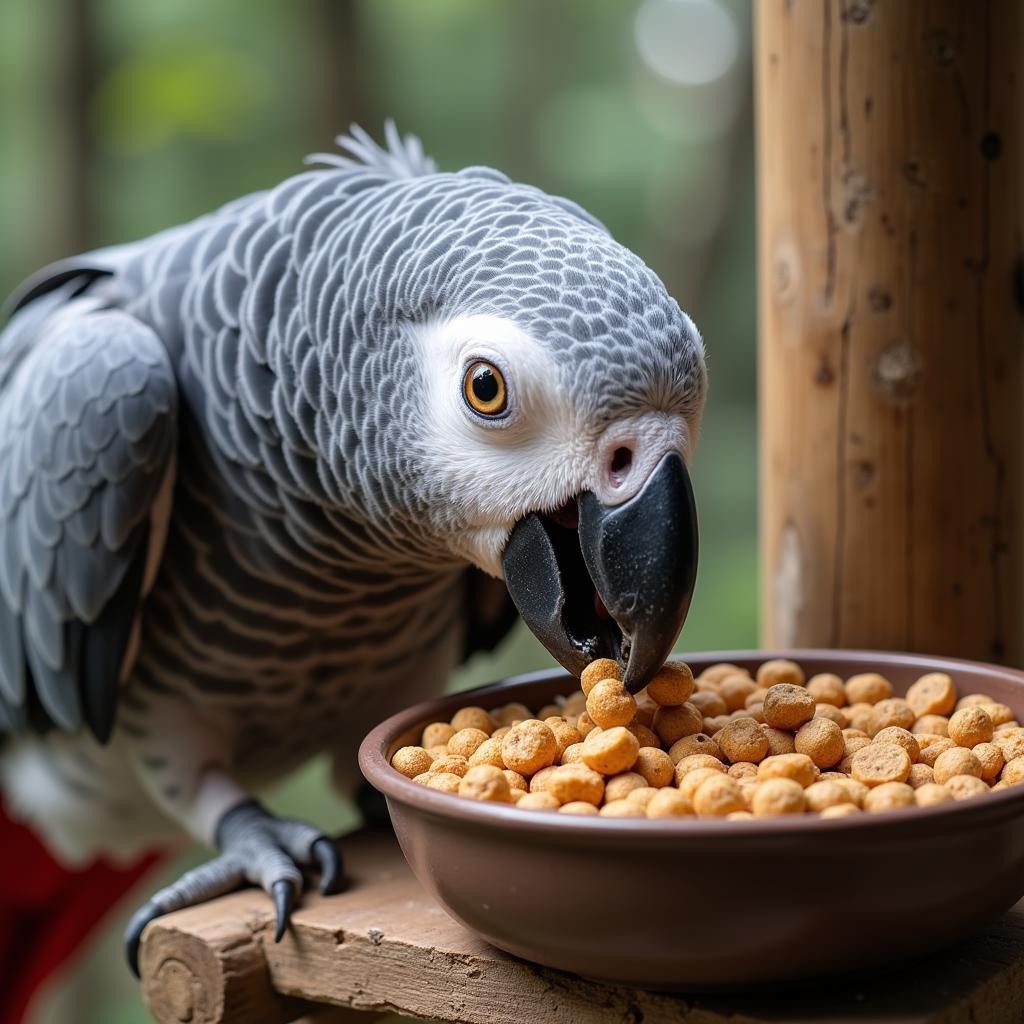The African Grey parrot, known for its remarkable intelligence and ability to mimic human speech, is a popular companion bird. But caring for this exotic species goes beyond providing a spacious cage and engaging toys. A crucial aspect of their well-being lies in providing a balanced and nutritious african grey parrot diet.
Beyond Seeds: Understanding Your Parrot’s Nutritional Needs
While seeds, particularly sunflower seeds, might seem like the go-to food for parrots, they are akin to junk food for these intelligent creatures. A diet solely based on seeds lacks essential vitamins, minerals, and nutrients vital for a thriving African Grey.
Essential Components of a Balanced African Grey Parrot Diet
A well-rounded african grey parrot diet consists of a diverse range of foods, mirroring their natural feeding habits in the wild:
- High-Quality Pellets: Commercially prepared pellets should constitute about 60-70% of their daily intake. Choose pellets specifically formulated for African Greys, ensuring they are free from artificial colors, flavors, and preservatives.
- Fresh Fruits and Vegetables: Aim for 20-30% of their diet to comprise a variety of fresh produce. Offer a rainbow of colors – dark leafy greens like kale and spinach, vibrant bell peppers, sweet berries, and crunchy carrots, to name a few.
- Healthy Grains: Cooked brown rice, quinoa, and oats provide essential carbohydrates and fiber.
- Protein Sources: Incorporate lean protein sources like cooked beans, lentils, and occasionally, small amounts of cooked chicken or fish.
- Calcium: Cuttlebone or mineral blocks provide essential calcium for strong bones and beak health.
Foods to Avoid Feeding Your African Grey Parrot
Just as crucial as providing nutritious foods is avoiding those that can be harmful:
- Avocado: This fruit contains persin, a toxin that can cause respiratory distress in parrots.
- Chocolate: Theobromine in chocolate is toxic to parrots, leading to digestive issues and even seizures.
- Caffeine: Found in coffee, tea, and some sodas, caffeine can cause hyperactivity and heart problems in birds.
- Salty or Sugary Foods: Processed foods high in salt, sugar, and fat can lead to obesity and other health problems.
- Alcohol: Alcohol is extremely toxic to birds, even in small amounts.
Tips for a Healthy Feeding Routine
- Variety is Key: Offer a variety of foods daily to prevent boredom and ensure your parrot receives a wide range of nutrients.
- Introduce New Foods Gradually: When introducing new foods, do so one at a time to monitor for any adverse reactions.
- Fresh Water Daily: Provide fresh, clean water daily in a clean bowl.
- Monitor Food Intake: Observe your parrot’s eating habits and adjust portion sizes accordingly to prevent overfeeding or malnutrition.
Understanding Your Parrot’s Body Language
Parrots are intelligent creatures and often communicate their needs through body language:
- Regurgitation: While seemingly alarming, regurgitation can be a sign of affection in parrots. They may regurgitate food to show affection or to feed their mate or offspring.
- Feather Plucking: While not always diet-related, feather plucking can sometimes indicate nutritional deficiencies.
- Lethargy: A sudden decrease in activity or appetite can be a sign of illness and requires immediate veterinary attention.
 African Grey Parrot Eating Nutritious Pellets
African Grey Parrot Eating Nutritious Pellets
FAQs about an African Grey Parrot’s Diet
Q: Can African Grey parrots eat nuts?
A: Yes, nuts can be offered in moderation as a treat. Choose unsalted and unshelled varieties like almonds, walnuts, and pecans.
Q: How much food should I give my African Grey parrot daily?
A: A general guideline is about 1/4 to 1/2 cup of food daily, adjusting based on your parrot’s size, activity level, and metabolism.
Q: What are some signs of a healthy African Grey parrot?
A: A healthy African Grey parrot has bright, clear eyes, smooth and shiny feathers, a clean vent, and exhibits active and alert behavior.
Q: Can I give my African Grey parrot table scraps?
A: It’s best to avoid table scraps as many human foods contain ingredients harmful to parrots.
Q: How often should I change my parrot’s food and water?
A: Provide fresh food and water daily to prevent bacterial growth and ensure your parrot has access to clean and appealing sustenance.
Seeking Further Information
For more insights into caring for your African Grey parrot, explore related articles on:
- african grey and red crowned amazon
- african grey parrot egg laying season
- african grey smartest bird
- african birds parrot
- african elephant what do they eat
Providing a balanced african grey parrot diet is fundamental to their health, happiness, and longevity. By understanding their nutritional needs and recognizing the signs of a healthy bird, you can ensure your feathered companion enjoys a long and fulfilling life by your side.
Contact us for immediate support via Phone Number: +255768904061, Email: [email protected]. Or visit our physical address: Mbarali DC Mawindi, Kangaga, Tanzania. Our dedicated team provides 24/7 customer service.
Leave a Reply